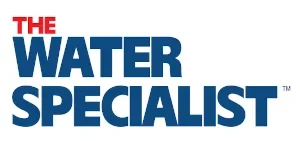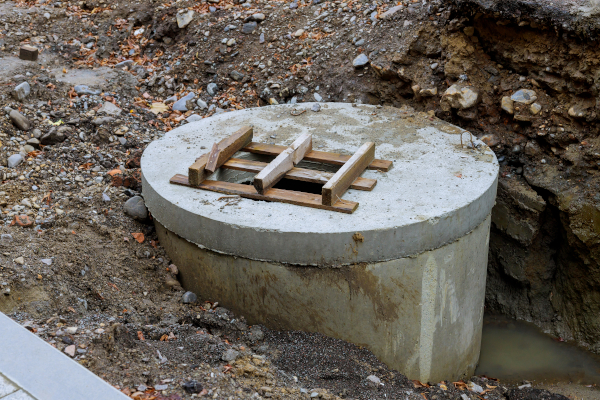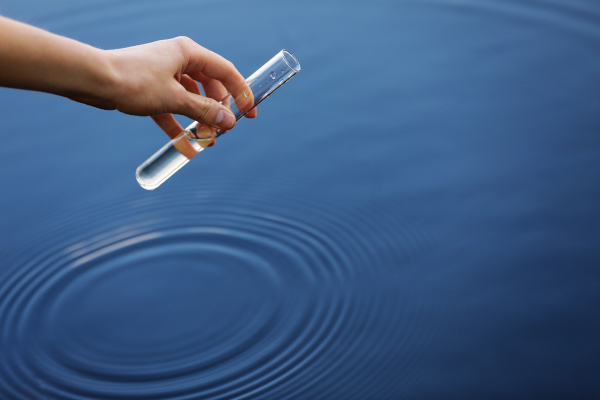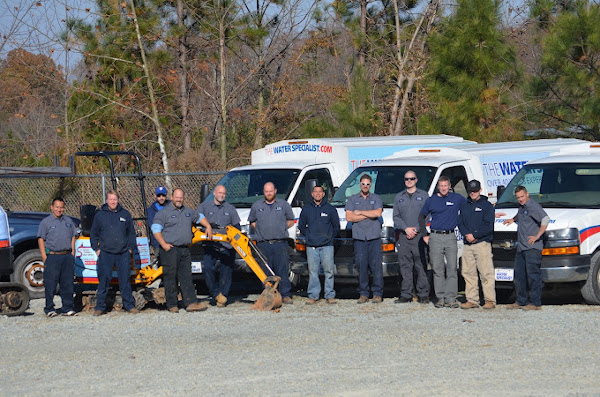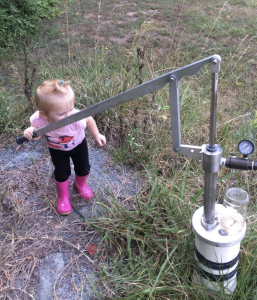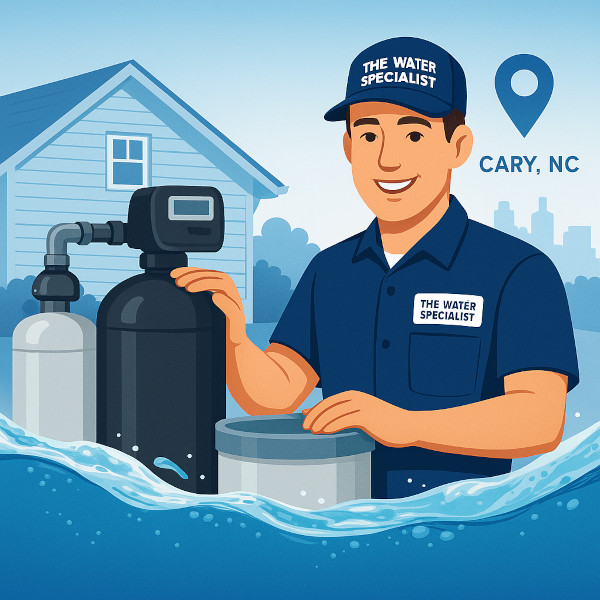
Looking For a Water a Water Treatment System in Cary, NC?
Call The Water Specialist Today!
Selecting the proper water treatment system is vital for maintaining clean and healthy drinking water in your Cary home.
The selection of a proper water treatment system for your Cary residence remains essential to provide your family with clean and safe drinking water. The search for the best water treatment system can appear daunting whether you want to eliminate water contaminants or merely boost water quality. Our guide will help you identify important factors and select a water treatment system that meets your requirements.
After reading this article you’ll have a clear understanding of how to select the appropriate water treatment system for your household and the factors to consider when choosing the best system for Cary NC. We’re going to investigate various water purification methods to understand their advantages and determine the optimal choice for your household.
Types of Water Treatment Systems
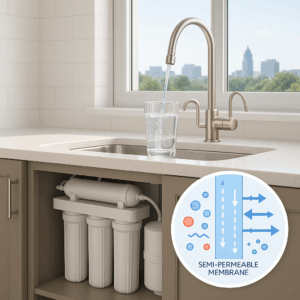
1. Reverse Osmosis Systems
Among water purification methods, reverse osmosis stands out as one of the most efficient techniques. The system functions by pushing water through a semi-permeable membrane that removes contaminants such as chlorine, lead, fluoride and additional impurities. Households can achieve chemical-free drinking water by using this system. A reverse osmosis system can greatly enhance water taste and quality for safe drinking purposes.
Reverse osmosis systems provide significant benefits to households located in regions that have hard water or elevated levels of contaminants. Determine if reverse osmosis is appropriate for your Cary home by testing your water to identify which contaminants require filtration.
2. Water Softeners
Water softeners help homeowners in Cary, NC address the prevalent hard water problem in the area. High mineral content in hard water includes calcium and magnesium that leads to plumbing problems and appliance damage while also affecting your skin. Water softeners replace mineral ions with sodium ions through the use of salt or potassium to soften hard water.
Finding yourself dealing with mineral deposits on faucets or showerheads or plumbing pipes indicates that a water softener would work as an ideal answer. Water softeners help reduce soap scum buildup and make dishwashers and washing machines work more efficiently.
3. UV Water Treatment
UV water treatment systems eliminate harmful bacteria and viruses from water through ultraviolet light exposure. UV water treatment systems are best suited for people concerned with biological contaminants in their water. UV water treatment successfully eliminates harmful pathogens from water while keeping its taste and chemical structure intact.
Private well owners frequently select UV treatment systems because they provide additional defense against harmful microorganisms found in untreated well water.
4. Home Water Filtration Systems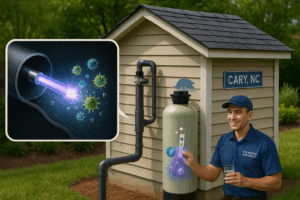 Water filtration systems for home use come in a variety of models including pitcher-based systems and under-sink units. These systems employ a variety of filter materials like activated carbon or ceramic to eliminate chlorine alongside sediments, heavy metals and other harmful substances from water.
Water filtration systems for home use come in a variety of models including pitcher-based systems and under-sink units. These systems employ a variety of filter materials like activated carbon or ceramic to eliminate chlorine alongside sediments, heavy metals and other harmful substances from water.
Installing and maintaining these filtration systems usually requires minimal effort. Homeowners seeking an uncomplicated and economical solution to enhance both the taste and quality of their tap water should consider these systems.
Selecting the appropriate water treatment system for your household requires careful consideration.
Selecting the best water treatment system available in Cary NC proves challenging. Your family requires a water treatment solution tailored to your specific needs which enhances the quality of your water. We will go through essential procedures which will enable you to make an educated decision.
1. Assess Your Water Quality
Understanding your water quality represents the initial step toward selecting the appropriate water treatment system. Does your water contain chlorine contamination or heavy metal pollutants? Do you have hard water issues? Do you depend on water from a well or does your water come from a municipal source? To assess your water quality, you can:
• Get a Water Test: Water testing allows you to identify what specific contaminants are present in your water. With the test results you will understand which water treatment system meets your requirements.
• Know the Common Contaminants in Cary NC: Many Cary homeowners require water softeners to address the area’s common hard water issues. UV water treatment becomes an ideal choice if bacteria and viruses present problems in your well water.
Identifying the specific contaminants present in your water allows you to focus on selecting the most effective treatment solutions.
2. Determine Your Water Treatment Goals
What do you want to achieve with your water treatment system: better water taste, removal of particular contaminants or protection from hard water effects? The objectives you set for treating your water will dictate which system you should use.
• For Safe Drinking Water: Reverse osmosis and activated carbon filtration systems excel at eliminating harmful contaminants and enhancing water taste to deliver clean drinking water.
• For Hard Water: Water softeners work to reduce mineral deposits while safeguarding plumbing systems and appliances.
• For Biological Contaminants: UV water treatment provides an optimal solution for disinfecting water by eliminating harmful bacteria and viruses.
3. Consider Your Budget and Installation Needs
Water treatment systems have various pricing options. Reverse osmosis systems and UV treatments may have higher initial costs but deliver superior water purification results. Water softeners typically offer an affordable solution while needing only basic installation steps.
Take into account the continuous maintenance fees and periodic replacement expenses. Reverse osmosis systems and UV treatments mandate regular replacement of their filters and UV bulbs. You must determine if the system requires professional installation or if you can handle it yourself.
Important Factors to Evaluate When Selecting a Water Treatment System
1. Space and Installation
The physical space available in your home should be considered when selecting a water treatment system for installation. Reverse osmosis systems and water softeners need enough space to install under your kitchen sink, inside a garage, a closet or inside a basement area. Choose a system that will fit well in your space and be easy to install. If necessary, outdoor sheds may provide a space for certain water treatment systems.
2. Maintenance and Long-Term Costs
Maintenance requirements vary among water treatment systems. While certain systems need routine filter replacements others only require infrequent maintenance sessions. When selecting your system, always account for how much time and money you will spend on maintenance.
3. Water Flow Rate
The water flow rate of the treatment system becomes important when you have numerous bathrooms or multiple family members. Reverse osmosis systems often produce a slightly reduced water flow which might pose problems for homes with large water consumption.
Water Treatment Systems Comparison
Reverse osmosis removes contaminants and improves water taste through slow filtration but requires more maintenance in homes with high contamination concerns.
Water Softeners minimize hard water issues and stop buildup but require routine salt replacements.
UV water treatment systems eliminate bacteria and viruses but they require power and they do not filter out chemicals from well water or biological contamination.
Home water filtration systems enhance taste and installation simplicity while they cannot eliminate every contaminant, people seeking simple water purification solutions should choose The Water Specialist.
Contact Us Today!
Selecting the appropriate water treatment system is essential for maintaining safe and clean water for your family. The ideal water treatment solution for your Cary home emerges when you assess your particular requirements related to water purification, softening, UV treatment, or any combination of systems.
Schedule a consultation with us today to explore residential water treatment solutions for your Cary, NC home. Explore The Water Specialist for more information or submit a request through this contact form to receive customized assistance.
FAQs
1. Which residential water treatment system will work best for my Cary home?
Your specific water quality and requirements determine which water treatment system will be best for you. Water softeners serve as the optimum solution for treating hard water. A reverse osmosis system provides contaminant removal and ensures safe drinking water. UV water treatment presents an effective method to destroy bacteria and viruses when dealing with biological contaminants. A water test will help you find the system that meets your water quality requirements.
2. How to select the appropriate water treatment system?
Selecting the appropriate water treatment system requires understanding your water quality needs.
Determining the correct water treatment system requires you to evaluate your water quality. Perform water testing to detect the presence of standard contaminants such as chlorine and heavy metals along with bacteria. You may require a water softener when dealing with hard water. Reverse osmosis systems provide a solution for water with chemical contaminants. A UV water treatment system works well to handle biological issues.
3. What is the recommended schedule for replacing filters in my water treatment system?
Your water treatment system determines how frequently you need to replace filters. Filter changes in reverse osmosis systems happen every 6–12 months but water softeners require regular salt replenishment. Users must replace the UV bulb in UV water treatment systems every year. Following your system manufacturer’s maintenance instructions ensures that your system operates at peak efficiency.
4. Is it possible for me to set up my water treatment system on my own?
Under-sink water filters represent some systems which homeowners can install themselves without professional help. Professional installation is necessary for complex systems such as reverse osmosis and water softeners when plumbing changes must be made. Professional assistance is often needed to properly set up UV water treatment systems.
5. Is reverse osmosis water safe to drink?
Drinking water that has been processed through reverse osmosis filtration systems is typically safe for human consumption. The system provides reliable purification by eliminating chlorine, lead, fluoride and bacteria from water, resulting in safe drinking water. Some people prefer to add beneficial minerals back into RO water after they have been stripped away by the filtration process.
